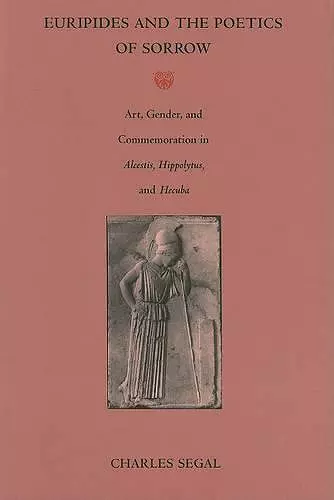Euripides and the Poetics of Sorrow
Art, Gender, and Commemoration in Alcestis, Hippolytus, and Hecuba
Format:Hardback
Publisher:Duke University Press
Published:21st Oct '93
Currently unavailable, and unfortunately no date known when it will be back

Where is the pleasure in tragedy? This question, how suffering and sorrow become the stuff of aesthetic delight, is at the center of Charles Segal's new book, which collects and expands his recent explorations of Euripides' art.
Alcestis, Hippolytus, and Hecuba, the three early plays interpreted here, are linked by common themes of violence, death, lamentation and mourning, and by their implicit definitions of male and female roles. Segal shows how these plays draw on ancient traditions of poetic and ritual commemoration, particularly epic song, and at the same time refashion these traditions into new forms. In place of the epic muse of martial glory, Euripides, Segal argues, evokes a muse of sorrows who transforms the suffering of individuals into a "common grief for all the citizens," a community of shared feeling in the theater.
Like his predecessors in tragedy, Euripides believes death, more than any other event, exposes the deepest truth of human nature. Segal examines the revealing final moments in Alcestis, Hippolytus, and Hecuba, and discusses the playwright's use of these deaths--especially those of women--to question traditional values and the familiar definitions of male heroism. Focusing on gender, the affective dimension of tragedy, and ritual mourning and commemoration, Segal develops and extends his earlier work on Greek drama. The result deepens our understanding of Euripides' art and of tragedy itself.
"Several interconnected themes unify this book. One is Euripides's mixture of 'mythic' elements with 'realistic' and ratiocinative ones, which produces new forms of tragic discourse. Another is Euripides's deconstruction of such comfortable oppositions as male/female and Greek/barbarian, which dissolves the barriers between actor and audience, self and 'other.' Segal develops his argument with great lucidity, patient reference to the text, broad and informed acknowledgment of the work of others, and an admirable ability to make connections between literary aperçus and the history of ideas."—Peter Burian, Duke University
"The essays are uniformly first rate; they advance the understanding of the plays in detail and in overall perspective; and they address deep, complex questions with a critical sophistication that, for this age, shows itself to be remarkably lucid and sane. I was delighted to learn new things about plays I knew very well, and to reexamine them in a new light."—Kenneth J. Reckford, University of North Carolina
ISBN: 9780822313601
Dimensions: unknown
Weight: unknown
328 pages